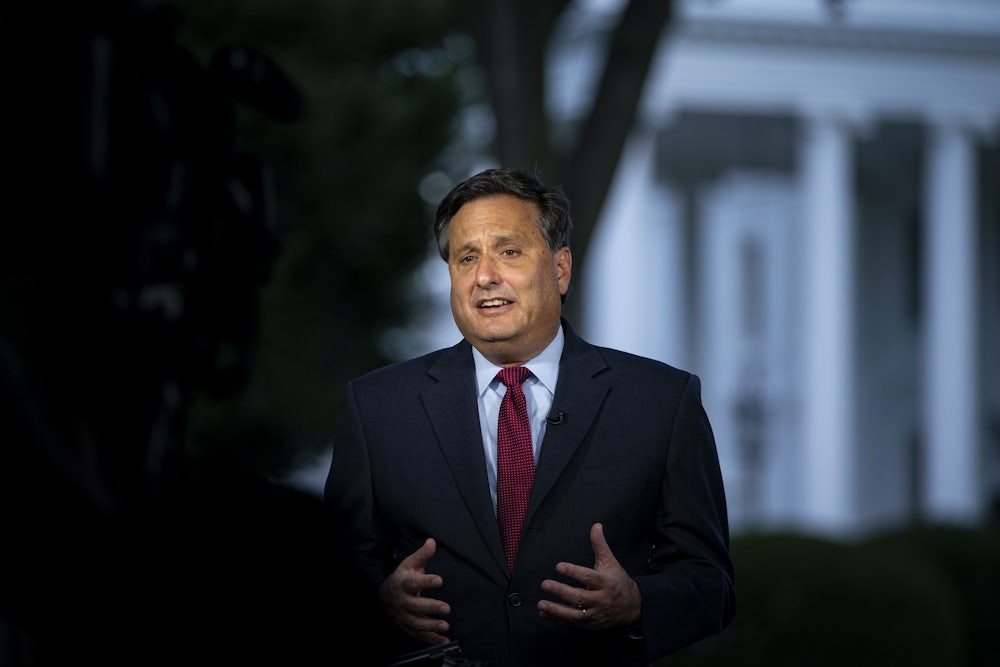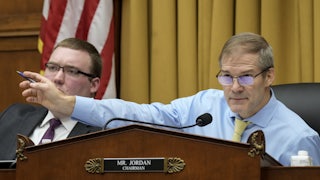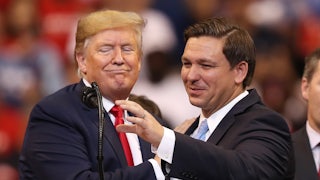Last Thursday, outgoing White House chief of staff Ron Klain, President Joe Biden, and Klain’s successor, Jeff Zients, took the stage in front of a crowd of White House staffers, family members, and reporters in the East Room. The gathering was a farewell event for Klain, who, stood at the president’s right, was clearly sentimental about the moment. Zients stood at the president’s left, occasionally cracking a modest smile while his hands were firmly interlocked below his tie. When it was Klain’s turn to give remarks, he had to fight being overcome with emotion.
“This is the best job I ever had,” he began as the waterworks rushed in. “And even though it’s also the hardest job I’ve ever had, I will miss this job, our work, this mission, and most of all this team every single day. But I take solace in knowing that I am leaving you in the best of hands. Jeff Zients will be the first White House chief of staff to have led two policy shops and be head of OMB before he took over as chief of staff.”
Klain’s remarks went for about 10 minutes. When he handed the podium over to Zients, the incoming chief’s remarks lasted less than half that long. The contrasts were subtle but still noticeable. Klain wore a black suit that matched his black hair. Zients had a blue suit that fit with his silver hair. He also was careful not to go off-script, even in tone, from his remarks as he thanked his family, Klain, and the president.
“That’s a tough act to follow, in many ways,” Zients said. His voice did crack for a second as he thanked his family and finished by saying, “Mr. President, thank you again for your trust in me and all of you here. We’re honored to serve you and our country.” That was it.
The differences at the event were yet another reminder to White House staff and Washington at large that a ripple effect comes with a chief of staff change. And in this particular changing of the guard, a lot of people are focused on things Klain did that few Democratic chiefs of staff of recent vintage have done: the role he played with progressive activists, and how they saw him as their real pipeline to policymaking within the Biden inner circle. Klain was viewed as something between a trusty liaison and an inside-man ally in the White House, and his departure has sparked a sense of adjustment within progressive circles.
Klain has proved he has the same outlook as progressives, said Jamaal Raad, the executive director of Evergreen Action. “I think that he’s generally of a progressive mindset,” Raad said. “He’s a like-minded individual that shaped the Biden administration to enact historic change, like they did with the Inflation Reduction Act, the largest climate investment in American history.”
“My best relationship was with Ron,” Congressman Ro Khanna said in a recent interview before going on to tick off the other good relationships he had: counselor to the president Steve Ricchetti, American Rescue Plan coordinator Gene Sperling, outgoing National Economic Council director Brian Deese, “and to some extent Louisa Terrell” (the director of the White House Office of Legislative Affairs).
That’s not by accident. This White House has made an effort going back to the 2020 campaign to make the progressive wing of the Democratic Party feel that it had a seat at the table. Think of the “unity task forces” Biden campaign aides (including Klain) set up with officials from Bernie Sanders’s campaign, which unveiled a set of policy proposals in July 2020 that borrowed from both candidates’ platforms.
White House officials, allies, and alumni are quick to stress that the outreach efforts have gone beyond the standard meetings with progressive groups and ostentatious olive branches. Beyond that, Klain took an unusually visible role in making himself accessible to the progressive community. At tense legislative points during Biden’s first term, he was in close and regular contact with standard-bearers like Sanders and Elizabeth Warren, a fact that was often reported in the press.
It paid off. “Progressives are a big part of our party, and making sure their voices are heard here at the White House is a big part of my job,” Klain told The Daily Beast about a year ago.
Even before his departure there was hand-wringing among progressives and their allied groups over what it would mean. Would the elevation of Zients, an alumnus of Bain & Company with a long corporate résumé and no organic connections to the Democratic Party’s liberal base, mean that this White House would take a more centrist turn as Biden gears up for reelection?
“Oh, I think it’s a bad thing. I think Klain is a hero,” Jeff Hauser, the founder and director of the Revolving Door Project, said of Klain leaving. “I mean he’s not perfect, none of us are, but I think he seems to have had a real appreciation for the way American politics and political economy has changed.”
In my interview with Khanna, I suggested that going forward, this White House might not have a figure like Klain who progressives see as their go-to person (never mind the multiple offices and officials whose job it is to stay in contact with that wing of the party). Khanna responded, “I think that’s fair. The graveyards are filled with men who thought themselves indispensable. Maybe in Klain’s case he’s proving the exception to that rule.”
Zients, though, isn’t coming with the same relationships that Klain is leaving with. “Jeff is not what I would call a political person. So it’s not just progressives who are going to be trying to find out how to make the inroads in that office, it’s everybody,” a former White House official said.
The official went on to argue that now Zients will have three major dynamics to deal with that Klain didn’t: the barely GOP-controlled House of Representatives, the upcoming presidential election, and the fact that a divided government makes passing legislation nearly impossible. Going forward, this administration will have to look more to implementing policies through federal agencies.
“So Zients is very good with that, but in the days since that announcement, I’ve had at least a dozen progressive leaders ask me for his cell number or introductions because those relationships just aren’t there,” the former official said. “But what it really means practically is the others in that senior orbit are the ones who are going to have to carry the weight for progressives, and those are where you’re going to have complications by people who are willing to lend an ear and to partner,” the official said. “That would be your Anita Dunn, your Bruce Reed. I know that those are different relationships than [the ones] Ron had.”
Progressives are usually wary that they will only get surface-level pleasantries but nothing more when mainstream Democrats control the White House. That was a common complaint during the Clinton presidency and even during the Obama years. But two years into the Biden administration, there’s a sense that they have been heard and seen. The wariness is back, though, with the entrance of Zients. The fear is that the pipeline that Klain created won’t exist under Zients or anyone who comes after him. But the dynamic is very different for Zients than it was for Klain. His tenure in the immediacy is about circumventing the gridlock that comes with divided government and also keeping the various wings of the Democratic Party confident in the Biden agenda. It’s not about proving that Biden can be progressive, it’s about showing that he will continue to be progressive.






